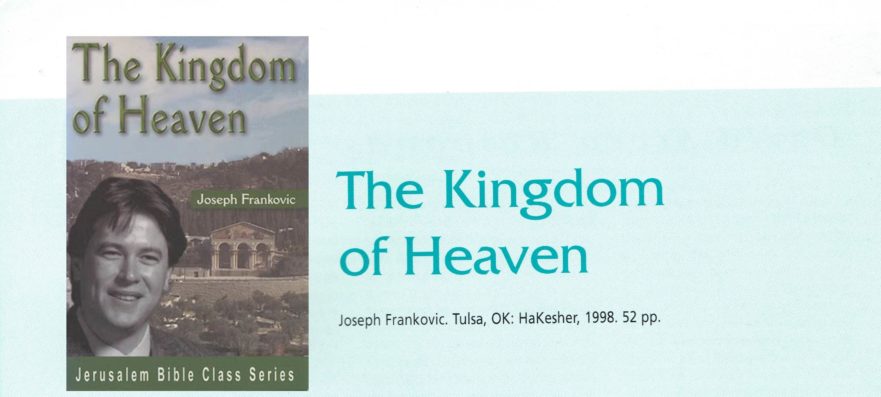Jesus never neglected an opportunity to speak about the Kingdom of Heaven. Originally intended to be a clear message, it has degenerated into a static-laden inter-communication between Jesus and too many of his modern-day followers. Happily for those trying to tune into Jesus’ program, Joseph Frankovic has enucleated the most significant conceptual aspects of the Kingdom of Heaven from the Synoptic Gospels and presented them in a readable booklet.
The author acknowledges that while reading the Synoptic Gospels one encounters difficult passages for trying to grasp exactly what Jesus meant by the Kingdom of Heaven. For centuries scholars have wrestled with identifying the precise moment when the Kingdom of Heaven was (or, will be) inaugurated. Should one envision it in terms of an inchoate model, as C. H. Dodd’s “realized eschatology” teaches? Or is Albert Schweitzer’s model of a “sequente Eschatologie” closer to the mark? Frankovic argues for neither: “The Kingdom of Heaven is the present reality of God’s redemptive power in the world today” (italics mine, p. 35).
According to the author, “The sages and rabbis were fond of talking about God in terms of his people enthroning him as king…. [They] enjoyed talking about people of faith who had submitted their wills to God and were allowing him to reign in their lives” (p. 12). Thus, by consulting what ancient Jewish commentators said about certain biblical passages, one can gain powerful insights into Jesus’ perception of the Kingdom of Heaven. Frankovic zeros in on key interpretations that become attached to Exodus 15:18 and 20:2. He concludes that Jesus neither coined the term nor originated the concept, but borrowed it from the parlance of Israel’s sages and tailored its content for his distinctive purposes.
Distinguishing between the two principal nuances that the Kingdom of Heaven carries in Jesus’ teachings is another important step toward a more accurate understanding. Jesus often employed the term to mean that God had taken charge. In other words, whenever God acts redemptively, one may say that God’s Kingdom has come (cf. Luke 11:20). Jesus also spoke of the Kingdom of Heaven in reference to that group whose adherents had embraced his messianic claims (cf. Matt. 11:11). In other words, those people who had allied themselves with the redemptive movement that he was leading constituted the Kingdom of Heaven. Thus, Frankovic writes, “The common denominator…is God’s taking charge. Whenever a supernatural manifestation of God’s power occurs, he has taken charge. Likewise, God also has taken charge of the lives of those who have decided to follow Jesus” (pp. 49-50, endnote 12). Jesus’ followers have entered into an unique partnership. “Empowered by his [God’s] Holy Spirit, they selflessly dedicate themselves to the ongoing task of feeding, clothing, housing, educating, visiting, comforting, defending, redeeming and healing hurting humanity” (p. 38).
In essence, upon accepting Jesus’ call to discipleship, a person entered into the Kingdom of Heaven. For Jesus, entering meant that first one had to submit radically to God’s will. Obedience characterizes the lifestyle of a genuine follower of Jesus—regardless of whether that follower flourished nineteen centuries ago or lives today.
For anyone wanting to learn more about the responsibilities, demands, privileges and rewards of aligning oneself with this redemptive program, reading The Kingdom of Heaven and internalizing its message would be a good place to start.
Loren Huss, Anamosa, IA, U.S.A.
Download this 36-page pdf eBook for free from JP‘s Bookstore


































































































